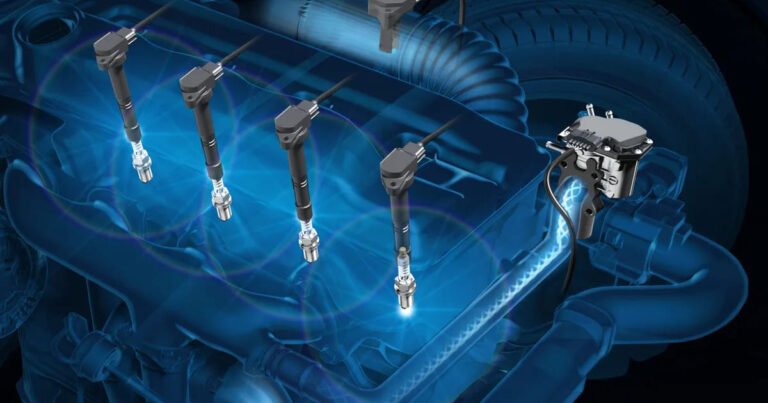The modern automobile is a marvel of engineering, combining various systems to ensure optimal performance, efficiency, and safety. Among these systems, the car engine management system plays a crucial role in maintaining the smooth operation of the vehicle’s car engine. This article will explore how car engine management systems work, their components, and their importance in modern vehicles.
What is a Car Engine Management System?
At its core, the car engine management system (EMS) is an electronic control system designed to manage the engine’s operation. It ensures that the car engine operates efficiently under various conditions, such as different speeds, loads, and temperatures. The EMS controls crucial aspects of the engine’s operation, including fuel injection, ignition timing, and emission control, ensuring that the engine runs smoothly and efficiently.
Components of a Car Engine Management System
The car engine management system consists of several key components, each playing a vital role in the overall functioning of the engine. These components include:
Engine Control Unit (ECU)
The Engine Control Unit (ECU) is the brain of the car engine management system. It processes data from various sensors and controls the engine’s operation accordingly. The ECU is responsible for adjusting the fuel injection, ignition timing, and other critical functions based on the data it receives.
Sensors
Various sensors are used in the car engine management system to monitor different aspects of the engine’s operation. Some of the key sensors include:
- Oxygen Sensor: Measures the amount of oxygen in the exhaust gases, helping the ECU adjust the air-fuel mixture for optimal combustion.
- Throttle Position Sensor: Monitors the position of the throttle, allowing the ECU to adjust the fuel injection and ignition timing accordingly.
- Mass Air Flow Sensor: Measures the amount of air entering the engine, helping the ECU determine the appropriate amount of fuel to inject.
- Engine Temperature Sensor: Monitors the engine’s temperature, allowing the ECU to adjust the fuel mixture and ignition timing for optimal performance.
Actuators
Actuators are devices that receive signals from the ECU and execute the necessary actions. These include fuel injectors, ignition coils, and idle air control valves. The actuators work together to ensure that the engine operates smoothly and efficiently.
Fuel Injection System
The fuel injection system is responsible for delivering the correct amount of fuel to the engine’s cylinders. In modern engines, this is typically done using electronic fuel injectors controlled by the ECU. The ECU determines the optimal fuel injection timing and amount based on data from the sensors.
Ignition System
The ignition system is responsible for igniting the air-fuel mixture in the engine’s cylinders. The ECU controls the ignition timing, ensuring that the spark occurs at the right moment for optimal combustion.
How Does a Car Engine Management System Work?
The car engine management system operates through a continuous loop of data collection, processing, and action. Here’s how the process works:
Data Collection
The process begins with the various sensors in the car engine management system collecting data from different parts of the engine. This data includes information on air intake, exhaust gases, throttle position, engine temperature, and more.
Data Processing
The collected data is sent to the ECU, which processes it to determine the current operating conditions of the car engine. The ECU uses this information to make real-time decisions about how the engine should operate. For example, if the oxygen sensor detects that the air-fuel mixture is too rich (too much fuel), the ECU will adjust the fuel injection to lean out the mixture.
Action
Based on the processed data, the ECU sends signals to the actuators, which then carry out the necessary actions. This could involve adjusting the fuel injectors to change the amount of fuel being delivered, altering the ignition timing to ensure optimal combustion, or controlling the idle air control valve to maintain a steady engine idle speed.
Continuous Monitoring
The car engine management system continuously monitors the engine’s operation, making adjustments as needed to ensure optimal performance. This continuous loop of data collection, processing, and action allows the engine to adapt to changing conditions, such as different driving speeds, loads, and environmental factors.
The Importance of Car Engine Management Systems
The car engine management system is critical to the overall performance and efficiency of modern vehicles. Here are some of the key benefits:
Improved Fuel Efficiency
One of the primary functions of the EMS is to optimize the air-fuel mixture for combustion. By continuously monitoring and adjusting the fuel injection, the system ensures that the engine uses fuel as efficiently as possible, reducing fuel consumption and emissions.
Enhanced Performance
The EMS plays a crucial role in ensuring that the engine delivers optimal performance under various conditions. By adjusting the ignition timing, fuel injection, and other factors, the system helps the engine produce more power when needed and operate smoothly at all times.
Reduced Emissions
Modern car engine management systems are designed to reduce harmful emissions by optimizing the combustion process. The system ensures that the engine operates efficiently, reducing the production of pollutants such as carbon monoxide, hydrocarbons, and nitrogen oxides.
Diagnostic Capabilities
The EMS also plays a key role in diagnosing potential issues with the engine. When a problem is detected, the ECU can trigger a warning light on the dashboard, alerting the driver to the issue. This helps in early detection and repair of engine problems, preventing more significant issues down the line.
Conclusion
The car engine management system is a sophisticated and essential component of modern vehicles, responsible for ensuring optimal engine performance, efficiency, and emissions control. By continuously monitoring and adjusting various aspects of the engine’s operation, the EMS helps to enhance the driving experience, improve fuel efficiency, and reduce environmental impact. Understanding how these systems work can help drivers appreciate the technology that goes into making their vehicles run smoothly and efficiently.
